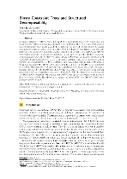Binary Constraint Trees and Structured Decomposability

Datum vydání
2023Publikováno v
Leibniz International Proceedings in Informatics, LIPIcsNakladatel / Místo vydání
Schloss-Dagstuhl - Leibniz Zentrum für InformatikRočník / Číslo vydání
280ISBN / ISSN
ISBN: 978-3-95977-300-3eISSN: 1868-8969Informace o financování
UK/I-UK/I-MFF
UK/COOP/COOP
Metadata
Zobrazit celý záznamKolekce
Tato publikace má vydavatelskou verzi s DOI 10.4230/LIPIcs.CP.2023.22
Abstrakt
A binary constraint tree (BCT, Wang and Yap 2022) is a normalized binary CSP whose constraint graph is a tree. A BCT constraint is a constraint represented with a BCT where some of the variables may be hidden (i.e. existentially quantified and used only for internal representation). Structured decomposable negation normal forms (SDNNF) were introduced by Pipatsrisawat and Darwiche (2008) as a restriction of decomposable negation normal forms (DNNF). Both DNNFs and SDNNFs were studied in the area of knowledge compilation. In this paper we show that the BCT constraints are polynomially equivalent to SDNNFs. In particular, a BCT constraint can be represented with an SDNNF of polynomial size and, on the other hand, a constraint that can be represented with an SDNNF, can be represented as a BCT constraint of polynomial size. This generalizes the result of Wang and Yap (2022) that shows that a multivalued decision diagram (MDD) can be represented with a BCT. Moreover, our result provides a full characterization of binary constraint trees using a language that is well studied in the area of knowledge compilation. It was shown by Wang and Yap (2023) that a CSP on n variables of domain sizes bounded by d that has treewidth k can be encoded as a BCT on O(n) variables with domain sizes O(dk+1). We provide an alternative reduction for the case of binary CSPs. This allows us to compile any binary CSP to an SDNNF of size that is parameterized by d and k.
Klíčová slova
Binary Constraint Tree, Binary CSP, Polynomial Equivalence, Structured Decomposability, Strucured DNNF
Trvalý odkaz
https://hdl.handle.net/20.500.14178/2322Licence
Licence pro užití plného textu výsledku: Creative Commons Uveďte původ 4.0 International




